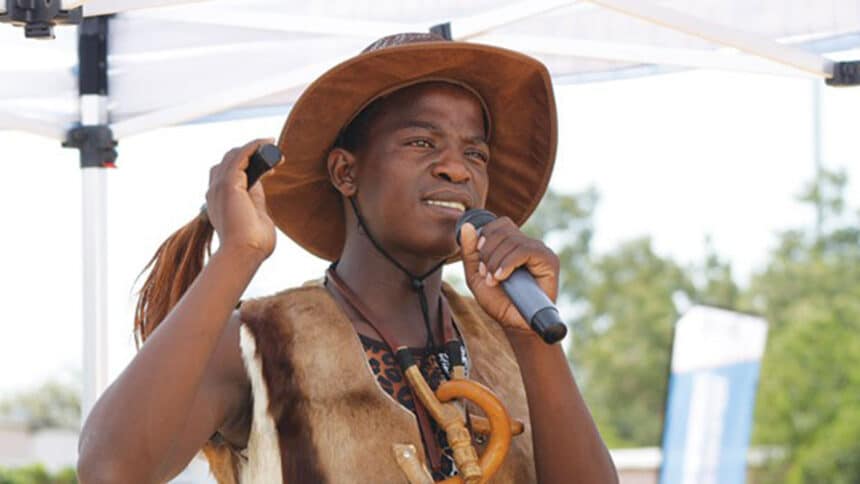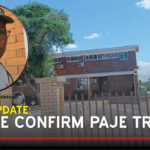Known across the land as ‘Serurubele,’ Edwin Moroka has become a cherished figure in Botswana’s literary and cultural circles, bringing traditional Setswana poetry to life for audiences of all ages.
With over a decade of experience as a traditional poet, Serurubele not only shares his art but has also taken up the mantle of teaching, passing down his knowledge to the next generation through his academy, Sekhutlwana sa Banye.
His journey from a young boy with a talent to a seasoned poet revered by many is one of passion, dedication, and a deep commitment to preserving Tswana heritage.
In this interview, Serurubele opens up about his artistic journey, his influences, and his hopes for the future of Tswana poetry.
Can you tell us a bit about your journey? How did you become a traditional Tswana poet?
It’s a very straightforward answer.
First, I grew up in a traditional setup, in an extended family.
This environment taught me a lot about our customs and traditions, as we had a lot of Setswana cultural activities at home.
People around me would often say I had a ‘poet’s voice’, even when I was still a young boy, which sparked my interest in poetry.
I watched traditional Tswana poetry videos and fell in love with it.
I started dabbling in poetry back in junior school, but I didn’t take it seriously until I was in tertiary.
That’s when I started performing for real audiences and got gigs at corporate events, weddings, and other ceremonial gatherings.
What inspired the name ‘Serurubele’? Is there a special meaning behind it?
‘Serurubele’ was a name given to me by people after I recited a poem praising the workers at Duma FM.
In the poem, I would say, ‘Duma Serurubele’ and people loved that line.
Soon, they couldn’t stop calling me Serurubele, so I embraced it as my stage name.
There’s nothing particularly special about the name itself, but it became part of my identity as a poet.
Describe your style of poetry.
I practice a style of poetry called ‘keledi’.
Keledi poetry is all about rhyme and cohesion, with hidden meanings woven into the words.
It incorporates ululation, allowing the poet a chance to catch their breath.
It’s also known as edu-poetry because it carries a message.
Preparing for a keledi performance requires research since each gig might be at a different kind of event.
The world is constantly changing, so it’s important for me to keep my poetry relevant.
But I also have the ability to freestyle on the spot – that’s just part of my gift!
How do you adapt your performances to suit different audiences?
Different events have different vibes.
For corporate events, I prepare thoroughly because the audience is usually more formal and educated.
Casual events, on the other hand, allow me to relax and enjoy myself; I can just showcase traditional poetry without having to stick to a structured format.
I have fun at these events, and I enjoy the open atmosphere.
And typically, how does the audience’s reaction vary between corporate settings versus more casual ones?
The reactions are generally the same because my poetry is both educational and entertaining.
People often comment on how well-informed and insightful I am as a poet, which is why they keep coming back for my performances or inviting me to teach.
What do your preparations for a performance involve, especially when it’s for a large or prestigious event?
I conduct extensive research.
No matter what the subject, I know I can quickly gather the information I need thanks to the internet.
This confidence helps me feel prepared for any event, whether it’s hosted by a government department or a private corporation.
What are the biggest influences on your poetry?
My biggest influence is the desire to teach children and keep our culture alive.
That’s why I established the Sekhutlwana sa Banye poetry academy, where I teach kids Setswana and guide them in becoming poets.
I want to pass on this gift God gave me, sharing it with young people who have a passion for poetry.
I even teach them to write Setswana books, and I recently published a book called ‘Thitelo’.
When did you realize you wanted to teach Setswana and poetry to others?
I realized the importance of teaching Setswana when I saw our language was fading, especially when I was in tertiary.
I was raised around elders rich in tradition, and I learned a lot about our culture just by watching and participating in activities.
This traditional knowledge has given me the cultural depth to teach Setswana.
Over time, people have come to trust me with this task, and I even receive requests from as far as South Africa to assist teachers and Batswana who want to keep the language alive.
So in your opinion, what role does traditional poetry play in preserving Tswana culture?
Poetry helps keep our language and culture alive, especially as it incorporates rich Setswana language that isn’t used in daily conversation.
Setswana poetry should be a cultural anchor, ensuring that the language doesn’t disappear.
As a poet, I even create new Setswana words, showing that the language is dynamic and can evolve with the times.
What message or themes do you hope to convey in your poetry?
I focus on current events and what’s happening in Botswana and around the world.
My poetry is educational and informative, but it’s also entertaining.
I address serious issues like freedom of expression, gender-based violence, and human rights.
My goal is to use poetry to promote awareness and spark meaningful discussions.
What challenges do you typically face as a traditional poet in today’s world?
One major challenge is that Setswana itself is at risk of extinction.
People are now mostly speaking English, even with their children, so when I use deep Setswana, many struggle to understand.
Also, poets like myself are often underpaid, despite the cultural significance of our work.
What advice do you have for young people hoping to become poets?
I encourage young people to seek guidance from established poets who are committed to the craft.
For me, poetry isn’t just about gigs; it’s a way to give back to the community.
I often teach poetry to children for free, and I encourage upcoming poets to focus on why they want to pursue this path.
Any poems or pieces that you’re particularly proud of?
Yes, there are a few pieces that hold a special place in my heart.
One is the poem I did for Duma FM staff, titled ‘Duma Serurubele’, which really resonated with people.
I also have a poem I performed in honor of our former president at the Sir Seretse Khama Day in Parliament.
I always respect the Office of the President and will continue to perform for each new President to honor their role.
With traditional poetry evolving, what do you see as the future of Tswana poetry?
Honestly, I’m worried about its future because many new poets are more focused on profit than passion.
When I started, I volunteered a lot to build my experience.
Today, some poets want instant results without putting in the work, and that risks diminishing the art.
Finally, what’s next for Serurubele?
I’m working on a few projects.
I already have a book, and now I’m looking into releasing CDs, digital applications, and illustrations, all aimed at preserving our culture.
I also organize poetry gatherings for kids, creating opportunities for them to hone their skills.
How do you feel about the newly selected government? Any comment?
I’m pleased with the new administration.
I’m hopeful they will support the creative sector, which can contribute significantly to the country’s economy.
I’ll definitely write a poem to honor the president and the work he’s doing.
And finally, Thank God It’s Friday, and a public holiday no less! What are your plans for the weekend?
I’ll be performing at a birthday celebration in Mathethe.
It’s my only event this weekend since the country is still in the early stages with the new government.














